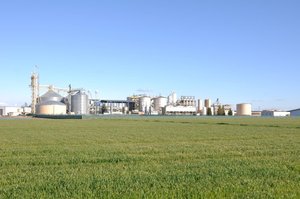Aemetis has announced the harvest of sorghum grown in Central California that grew between 12-15 feet tall. The 20 acre demonstration crop was grown using proprietary Nexsteppe seed genetics and harvested in 90 days by Aemetis. The water supply for the sorghum was lower quality pump water containing salts that typically damage crops in western San Joaquin Valley, an area with little water allocation for ag crops. The sorghum will be used to produce advance biofuels.
 “Nexsteppe’s sorghum is uniquely capable of growing a large amount of biomass in a short period of time using land that lacks quality water and where other plants may not grow,” said Eric McAfee, Chairman and CEO of Aemetis. “Biomass sorghum can be converted to cellulosic ethanol or a variety of other renewable fuels through various available technologies. Aemetis has already processed about 80 million pounds of grain sorghum at its Keyes biorefinery, producing lower-carbon fuel ethanol.”
“Nexsteppe’s sorghum is uniquely capable of growing a large amount of biomass in a short period of time using land that lacks quality water and where other plants may not grow,” said Eric McAfee, Chairman and CEO of Aemetis. “Biomass sorghum can be converted to cellulosic ethanol or a variety of other renewable fuels through various available technologies. Aemetis has already processed about 80 million pounds of grain sorghum at its Keyes biorefinery, producing lower-carbon fuel ethanol.”
The company is also a participant of the California In-State Sorghum program (CISS) through a $3 million grant awarded by the California Energy Commission. The CISS program combines research and market development to support the in-state growth of grain sorghum as a reliable low-carbon feedstock for California’s ethanol producers. The CISS program has just completed the first harvest of grain sorghum at the CSU Fresno International Center for Water Technology.
Aemetis’ 60 million gallon per year ethanol plant in California converts sugars to biofuels. The company has a multi-year strategy to transition its biofuel production from traditional starch-based feedstocks to renewable biomass feedstocks that can produce low-carbon, advanced biofuels. The transition is expected to evolve from corn to grain sorghum and ultimately to biomass sorghum and agricultural wastes available in California.
Anna Rath, CEO of NexSteppe, added, “Growing high-yield biomass sorghum in California is a milestone in the production of low-carbon feedstocks for biofuels. NexSteppe is focused on designing industrial sorghum feedstock solutions to support the growing biobased economy.”

